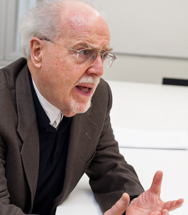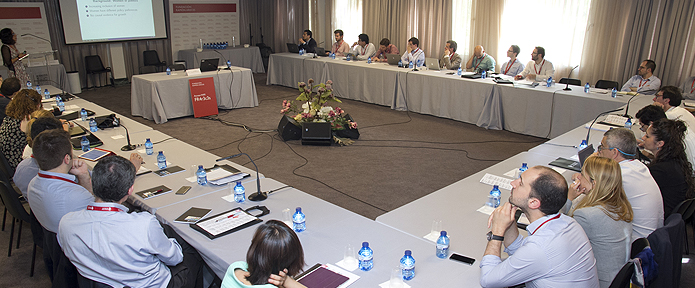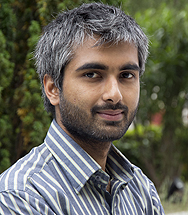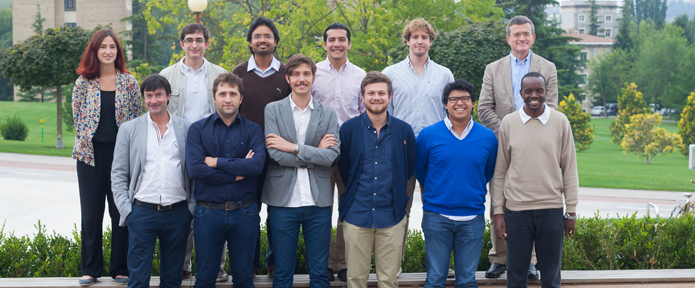Peter McCormick: "We need students who want to be rich to change the world"
The philosopher analyzed some of the main political and social challenges of today's Europe at framework of congress 'Emotions and Moral Values'.

Peter McCormick is a Fellow of the Royal Society of Canada; a permanent member of the Institut International de Philosophie in Paris; and Professor Emeritus of the Chair of Ethics "Fürst Franz-Josef und Fürstin Gina" of the Internationale Akademie für Philosophie of the Principality of Liechtenstein.
Among the awards he has received are the Medal of President from the University of Helsinki and the investiture as honorary doctor at Philosophy by the University of Athens.
Professor McCormick was one of the keynote speakers at the congress international ' Emotions and Moral Values', organized by the project 'Emotional culture and identity' of the Institute for Culture and Society of the University of Navarra, which is funded by Zurich Insurance.
On the occasion of his stay in Pamplona, he analyzed some of the main political and social challenges facing Europe today.
In one of his books, Poverty Among Immigrant Children in Europe (Palgrave, 2009), he discusses the problem of immigrant children in Europe. Is it really a serious problem in our societies?
Yes, it is.
When I retired from teaching 12 years ago, I settled in France, one of the richest countries in the world. Suddenly, I found a completely different status . What disturbed me most was not the sight of so many poor people on the streets, but the large number of children among these poor people.
Around the Gare du Nord, one of the most important train stations in Paris, early in the morning, I used to see children between 5 and 10 years old coming out from under the carriages, where they had spent the night sleeping. They would take out paper bags, fill them with glue and sniff the smells to stave off the pain of hunger.
This status opened my eyes and I started to see more and more homeless children on the streets of Paris. They sleep under cars because they know that if they do so on the streets, they are likely to be picked up by social groups trying to help them. The children see these groups as limiting their freedoms and therefore prefer to sleep under cars and steal at the station or prostitute themselves during the day.
Is it possible to help them?
It is difficult, but not impossible. People react differently to the problem of homeless children living on the street. A person with a strong social conscience, for example a journalist, can help by contacting these groups and writing about them status, doing what the French call 'reportage'. Being on the scene and writing about what would be for them a 'normal day' attracts the attention of many people, some of them with power and many resources. The journalist's story reminds them week after week that status is intolerable and that something must be done.
How to contribute from the academy?
You can reflect on the problem and write about it in a more professional way. Your target audience is no longer just those who normally read the newspaper, your audience is other members of thoughtful communities who have philanthropic interests and who want to help. Include influential people from the world of academia as well.
In Europe we have many university majors studying topic and many researchers who should be encouraged to continue their programs of study, and to do so, we have to put them on contact with 'patrons'. There is never enough money in the social sciences to do all the work they would like to do and, therefore, the private-sector funding is very important. It is journalists, again, who can help get that private-sector funding through their articles.
Europe is now facing an added challenge : the refugee crisis. How can it be tackled?
In the European Union, we can only sympathize with the experience of the inability to handle the dire needs identified and the frustration of 28 nations with different languages, cultures, histories and interests experimenting 24 hours a day with goal to make enriching decisions that, apparently, turn out not to be enriching. A coherent and fully effective policy cannot be achieved by bringing 28 such different communities together.
Can Europe learn something from its own history, especially World War II, to solve this crisis?
Historians say today that at least 12 million people were expelled from northern and German territories. They left their home and were forced, at a certain point, to make the decision to leave the land where they belonged.
One lesson that contemporary historians can propose to politicians to address their problems is, first of all, to recognize that the large Issue population from Syria, Lebanon or Jordan now arriving in Europe reminds Europeans of what they experienced after the end of World War II.
What is the best model for the integration of immigrants in Europe?
I come from a part of the world where immigration has historically been of great importance: the U.S. and Canada.
The Canadian integration model is different from the American one, where everyone adapts and becomes part of the 'great American dream'. In Canada, on the other hand, the government itself recognizes the diversity caused by immigration: "We want you to be a Canadian citizen, but we also want to keep all your cultural richness, so we are going to give you money to make sure that on Saturday mornings you take your children to study their mother tongue language ". In this way, the children do not forget their parents' language .
It is a particular model of society and I think it is what immigration needs: we are all Canadians and, at the same time, everyone can contribute with the richness of their individual traditions. Maybe we should learn from this in Europe and it would be interesting if we could all share the richness of our heritage with others.
Europe is also facing another social challenge : the widening gap between rich and poor in Europe. What are the consequences?
The increase in the separation between rich and poor is taking place at the expense of the class average . The class average is decreasing, most are moving to the leave part (class average -leave or class leave ) and very few are moving up to a higher stratum.
The gap between the richest 1% of people and the rest of the population is widening. However, I think this should not be seen as a real fatality. The reason is that in today's Western European society, the wealth that some people are amassing allows them to change their attitude and increasingly, rich people are becoming more generous. This is happening, for example, in the USA with Bill Gates and other rich people with philanthropic interests who want to help.
How is it possible to convince them to become involved in society?
It is very difficult to change a mentality, but it is possible.
In a study conducted at Princeton University, management students were asked why they chose degree program and more than half of them answered 'because they wanted to be rich and do something good with that money'. We need people like that, students who want to be rich to change the world. Until recently young people wanted to accumulate wealth to buy a boat, own seven houses or get married many times. Now there are people who want to be rich to help others; until now I haven't heard anything like that and it's a bright sign.
All this suggests that the purposes of change of the different classes of society are not fixed but will continue to develop and that, for the time being, there are very good reasons to think a little more positively about the future.




